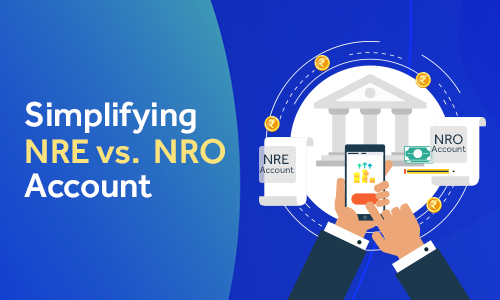SBI NRE FD Rates: Tax Benefits, Interest Rates & Impact on Your Tax Returns - NRI
SBI NRE FD Rates: Tax Benefits, Interest Rates & Impact on Your Tax Returns
24 February 2025
nre fixed deposit tax free interest nre deposit rates
The Impact of SBI's NRE FD Rates on Your Tax Returns
For NRIs, navigating India's tax system and financial regulations requires careful planning. The question - "Is interest on NRE account taxable in India?" is one of the most frequent asked queries by NRIs.
Learn how NRE account taxation impacts your returns, from tax-free interest earnings to competitive NRE FD rates at SBI. This guide helps you optimise your NRE account benefits, whether you're opening a new account or managing existing deposits.
What is an NRE Fixed Deposit?
State Bank of India's NRE Fixed Deposit (NRE FD) allows Non-Resident Indians to invest their foreign earnings in a safe, interest-bearing investment in India. One can deposit foreign income, including money earned while living overseas.
NRE fixed deposit is a type of term deposit account used to transfer foreign earnings in India. The tenure of the FD might affect the interest rate; longer tenures usually yield larger returns.
Tax Implications on NRE FD
Wondering if the interest on the NRE account is taxable? Learn about the tax implications of your NRE account interest earnings and SBI's current NRE deposit rates.
One of the primary benefits of owning investments in an NRE FD is that NRE account taxation is exempted in India. Let’s look at the tax implications on NRE FD below:
- SBI NRE FD accounts provide the benefit of tax-free interest earnings at competitive rates. As a result, the bank is not required to deduct tax on interest accrued from NRE savings accounts or NRE Fixed Deposits, allowing you to maximise your returns.
- The interest earned on NRE FDs may be subject to taxation outside India as tax treatment may vary based on the tax laws of your resident country.
- India has ratified Double Taxation Avoidance Agreements (DTAA) with several countries to avoid taxing NRIs twice on the same income. Tax exemptions or reductions for the interest generated on your SBI NRE deposit rates may be available if your resident country and India have a DTAA.
Tax Comparison: NRE vs. NRO Fixed Term Deposit Accounts
SBI offers both NRE and NRO FDs to NRIs. However, there is a difference between the two accounts. You should be aware of these key differences for your financial objectives and tax responsibilities.
Let’s look at them below:
- Interest received from NRE FD is tax-free. In contrast, interest received on an NRO FD is subject to taxation in India.
- NRE FD accounts by SBI are perfect for handling overseas savings and income. However, for NRIs who must manage the money they receive in India, NRO FDs are the best option.
- There are no limitations on transferring the capital and NRE account interest rate back to your resident country. On the other hand, NRO accounts allow you to return the principal and interest to your resident country. However, you can only send up to USD 1 million every fiscal year.
Boost Your Financial Growth with SBI NRE FDs
Minimum Investment
NRIs can start an NRE FD with SBI with an amount as low as ₹1,000. Choose the amount that best suits your financial objectives. However, larger deposits could give better interest rates.
Attractive Interest Rates
SBI offers competitive interest rates on NRE FDs, with rates varying based on the deposit tenure and amount. You may visit the NRE FD interest rates section on the SBI website to check the updated rates now.
Flexible Tenure Options
You can choose from a variety of tenure options, ranging from 1 year to 10 years, allowing for tailored investment strategies that align with individual financial goal.
Seamless Repatriation of Funds
NRE account balances, including savings and fixed deposits, are fully repatriable as per regulations. Non-residents can freely transfer funds to and from India, including interest earned, without restrictions.
Effortless Foreign Currency Remittances
NRE accounts enable direct foreign currency transfers without intermediaries. Funds can be freely used for personal or business purposes, including investments in India.
Conclusion
Beyond fulfilling regular banking needs, NRE accounts are a preferred choice for NRIs due to their tax-free interest earnings and full repatriation benefits. Denominated in Indian currency, these accounts provide a convenient way to save tax and manage funds in India while enjoying financial flexibility with ease of transfer.






















